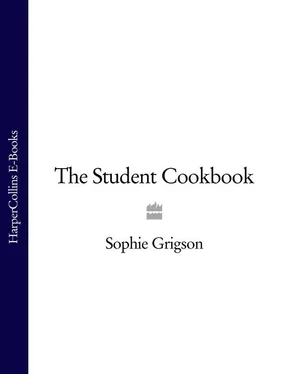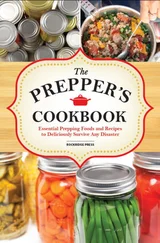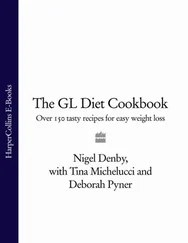The Student Cookbook
Sophie Grigson

For Florrie and Sid, who may find this book useful one day.
Cover Page
Title Page The Student Cookbook Sophie Grigson
Why Cook? Why Cook? Good question. Why should you learn to cook at all? You’ll get by just fine on take-aways, ready-meals, sandwiches, crisps and chocolate. Nobody needs to cook at all these days, as long as they own a microwave, a kettle and a toaster. This is potentially a good thing, and certainly hugely liberating. Before you throw the book down in disgust, let me explain. Cooking should be and can be a thoroughly enjoyable life-enhancing task. There is such pleasure to be had from working with beautiful, fresh, natural produce, from combining ingredients to expose their finest, most enticing flavours, a kind of magic that is there to be discovered by every person who walks into a kitchen with appetite and hunger. All this before you even get to the climax of the whole endeavour – the eating itself. How miserable then, when cooking becomes a tyranny, which it can when there is a day-in-day-out obligation to put a proper cooked meal on the table. So to me, the ideal is a balanced compromise between real cooking as often as possible, and convenience food as back-up for those days when work or play has sapped your energy. There’s nothing wrong with beans on toast every now and then. There are considerable health benefits to be had from cooking your own food, too. This is not a book about nutrition, but the fundamental principles of healthy eating are straightforward: variety, moderation, loads of veg and fruit. With you as head honcho in the kitchen, you can make yours a healthy, delicious way of eating that allows for occasional indulgences without guilt. To do that though, you will have to know how to cook. It’s really not at all difficult. It just takes a bit of practice and it will stand you in good stead for the rest of your life. Encapsulated in the recipes in this book are most of the basic techniques you will need to cook a myriad of dishes. It is not a ‘complete’ or ‘comprehensive’ course – that would be quite impossible. I’ve skipped over certain skills you can manage without for the time-being (e.g. making pastry). I have included a wide range of recipes covering both familiar foods and some that may be new to you, to get your culinary imagination in full working order. And finally, a kitchen motto that has worked well for me, ever since the day when I moved into my first bedsit, and began the task of learning to cook for real: don’t panic . If the worst does come to the worst (we all have off days) and you bodge it up completely, bin it, and send out for a pizza!
Techniques and General Tips
Chapter one Soups, Starters and Eggs
Chapter two Pasta, Pizza and Rice
Chapter three Meat and Poultry
Chapter four Stir-frying
Chapter five Fish
Chapter six Vegetables and Salads
Chapter seven Puddings, Cakes and Biscuits
Index
Acknowledgements
Copyright
About the Publisher
Good question. Why should you learn to cook at all? You’ll get by just fine on take-aways, ready-meals, sandwiches, crisps and chocolate. Nobody needs to cook at all these days, as long as they own a microwave, a kettle and a toaster.
This is potentially a good thing, and certainly hugely liberating. Before you throw the book down in disgust, let me explain. Cooking should be and can be a thoroughly enjoyable life-enhancing task. There is such pleasure to be had from working with beautiful, fresh, natural produce, from combining ingredients to expose their finest, most enticing flavours, a kind of magic that is there to be discovered by every person who walks into a kitchen with appetite and hunger. All this before you even get to the climax of the whole endeavour – the eating itself.
How miserable then, when cooking becomes a tyranny, which it can when there is a day-in-day-out obligation to put a proper cooked meal on the table. So to me, the ideal is a balanced compromise between real cooking as often as possible, and convenience food as back-up for those days when work or play has sapped your energy. There’s nothing wrong with beans on toast every now and then.
There are considerable health benefits to be had from cooking your own food, too. This is not a book about nutrition, but the fundamental principles of healthy eating are straightforward: variety, moderation, loads of veg and fruit. With you as head honcho in the kitchen, you can make yours a healthy, delicious way of eating that allows for occasional indulgences without guilt.
To do that though, you will have to know how to cook. It’s really not at all difficult. It just takes a bit of practice and it will stand you in good stead for the rest of your life. Encapsulated in the recipes in this book are most of the basic techniques you will need to cook a myriad of dishes. It is not a ‘complete’ or ‘comprehensive’ course – that would be quite impossible. I’ve skipped over certain skills you can manage without for the time-being (e.g. making pastry). I have included a wide range of recipes covering both familiar foods and some that may be new to you, to get your culinary imagination in full working order.
And finally, a kitchen motto that has worked well for me, ever since the day when I moved into my first bedsit, and began the task of learning to cook for real: don’t panic. If the worst does come to the worst (we all have off days) and you bodge it up completely, bin it, and send out for a pizza!
Конец ознакомительного фрагмента.
Текст предоставлен ООО «ЛитРес».
Прочитайте эту книгу целиком, купив полную легальную версию на ЛитРес.
Безопасно оплатить книгу можно банковской картой Visa, MasterCard, Maestro, со счета мобильного телефона, с платежного терминала, в салоне МТС или Связной, через PayPal, WebMoney, Яндекс.Деньги, QIWI Кошелек, бонусными картами или другим удобным Вам способом.













